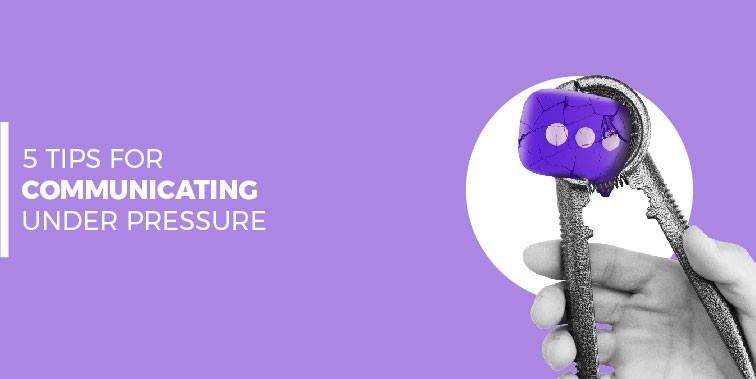5 Tips for Communicating Under Pressure
“Effective communication is 20% what you know and 80% how you feel about what you know.” – Jim Rohn․
How we talk and how we listen are the most important things for better and stronger communication.
But the other thing is when the pressure is on, this becomes even more important. During stressful situations it is exhausting to keep calm and communicate in the right way.
Effective communication in the workplace is a key leadership skill, and it is vital for any successful business.
No matter with whom we are communicating there are three principles for effective communication: speaking carefully, listening effectively and responding accurately.
But besides these three, there are so many important and necessary key points that can help you to communicate with your team.
Today we are going to understand the 5 of them and make our communications under pressure professional․
1. Be curious
As human beings, we tend to assume that we have a complete picture of something when, in fact, we are all limited by our own experience.
There are many crisis situations in the workplace where managers make hasty decisions without thinking that other team members can help them. In such a situation, the opinions of the employee-employer begin to collide and communication becomes difficult and emotionally almost impossible.
The only way to determine if you have a solid, complete picture of a situation is to ask others. In doing so, use careful, non-accusatory language, e.g. “I understand that I do not fully understand your point of view. Can you explain how you see the resolution of this situation?” Inviting others to share their thoughts can be a powerful way to encourage the exchange of information and reopen the conversation.
2․Speak Attentive
Be specific. Listeners are not mind readers. Explain the problem in detail or try to present it emotionally as much as possible. It is unlikely that others will know what we want or feel if we let them guess.
Stay focused and discuss only the current issue without being distracted. Getting out of the way, raising old issues is confusing, irritating. Do not say things that you do not mean and clearly present everything that you will not do.
Try to talk less. Silence is useful when there are many emotions. Often in emotional situations we say things that we do not mean. We tend to exaggerate or exacerbate the situation to an extent that is not realistic.
Follow the tone of speech and the style of saying. Avoid accusations. Keep comments descriptive, not critical or accusatory. Avoid criticism and inappropriate or sharp humor if you feel that they will cause tension.
3․ Listen by understanding
Put yourself in the place of the interlocutor. Try to understand their point of view completely.
Listen without interrupting. Sometimes to hear all the words you need to be silent. Focus on the words and pay attention to the gestures.
Successfully accept criticism. In a tense situation, be silent for a second, leave the room, drink water, walk or do something that will help you judge and not give in to emotions. Purify your emotional fears or anger. Only at this level you can healthy criticize and accept criticism.
Accept what is said without giving advice. There are cases when we think that the speaker is wrong, we need to interrupt and give advice.
4․ Answer thoroughly
Search and separate all the facts. Listen carefully until you understand what is being said. Ask the interlocutor to clarify everything you do not understand. But do not ask too many questions, as this may distract him from the subject. Coordinate the questions and give the most relevant and accurate ones.
Check your comments. The purpose of communication is to understand. You can check everything with the interlocutor to make sure that what you are hearing is exactly what the speaker meant. Ask the speaker if your point of view is correct. Try to approach the situation thoroughly and carefully, as it may lead to aggravation of the situation or, conversely, to the resolution.
Be honest in accepting the speaker’s feelings, for accepting them does not mean that you agree with them. Listen to yourself. Make a conscious effort to hear how you speak and how your interlocutor speaks. Do you have a positive or negative attitude? What is the tone of your voice? Sharp responses put others on the defensive. Follow through so that the speech is honest and emotionally balanced.
5․ Look at the big picture.
When it comes to tight-lipped meetings, it can be difficult to make good decisions. In case of any possible decision, ask yourself: Will this action help my team / client implement their strategy? Or am I really making it difficult? Such an approach is often expressed in people with high levels of emotional intelligence, as they are able to observe a number of perspectives at once. Instead of dwelling on everyday logistics, take the time to understand the larger business ecosystem.
We may not always get what we want, we can clearly state our desires so that we do not later accuse ourselves of not saying or saying anything. Understanding the needs and desires of others shows a caring attitude. When everyone involved in the communication process speaks and listens carefully, it is easier to share perceptions and feelings, moving towards understanding each other.
Try these tips to solve personal, professional or any other communication problems.
Share with us your tips and let’s make our communication better, stronger and professional.




